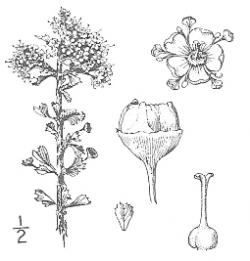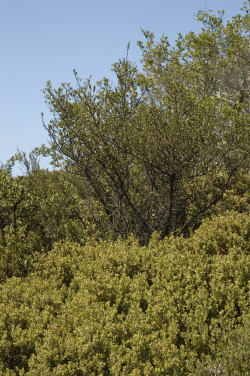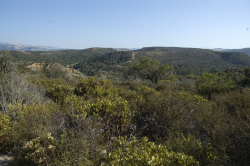
threatened

Illustration from Abrams (1951).

Photo taken at Fort Ord National Monument with sandmat manzanita (Arctostaphylos pumila) © 2007 Dylan Neubauer.

Ceanothus shown growing with chamise (Adenostoma fasciculatum var. fasciculatum), Eastwood’s goldenbush (Ericameria fasciculata), mock heather (Ericameria ericoides), and Monterey manzanita (Arctostaphylos montereyensis) at Fort Ord © 2007 Dylan Neubauer.



This fact sheet was prepared by Dylan M. Neubauer and Dean W. Taylor under award NA04N0S4200074 from the National Oceanic and Atmospheric Administration (NOAA), U.S. Department of Commerce (DOC). The statements, findings, conclusions, and recommendations are those of the authors and do not necessarily reflect the views of the NOAA or the DOC.
© Copyright 2006, Elkhorn Slough Coastal Training Program
Last updated: Sep 26, 2007 20:03
Common Names - Monterey ceanothus
Family - Rhamnaceae (Buckthorn Family)
State Status - none
Federal Status - none
Habitat
Maritime chaparral; < 550 m.
Key Characteristics
Mound-like to erect, densely branched shrub < 1.5 m; stems supporting brown to gray-brown twigs, not rooting at nodes; leaves opposite, evergreen, petiole < 2 mm, blade 4-10 mm, 4-6 mm wide, length generally < 2 x width, widely obovate to round, adaxially generally shiny, dark green, glabrous, abaxially paler, short-strigose or puberulent, tip rounded to truncate; flower blue to lavender; fruit 4-6 mm wide, more-or-less smooth, horns smooth, < 1 mm (Wilken 2013).
Flowering Period
February to May
Reference Population
Fort Ord National Monument (Monterey County).
Global Distribution
Endemic to the central coast of California in Monterey, Santa Cruz (presumed extirpated), and San Luis Obispo counties (CNPS 2012).
Conservation
Presumed extirpated in Santa Cruz County; field surveys needed. Occurrences in Monterey County continue to be impacted by development around the Monterey Airport.
References
Abrams, L. R. 1951. Illustrated Flora of the Pacific States, Vol. 3. Stanford University Press, Stanford, CA.
CNPS, Rare Plant Program. 2012. Ceanothus rigidus, in Inventory of Rare and Endangered Plants (online edition, v8-02). California Native Plant Society, Sacramento, CA. http://www.rareplants.cnps.org/detail/216.html [accessed 2 February 2015].
Fross, D. and D. H. Wilken. 2006. Ceanothus. Timber Press, Portland, OR.
Wilken, D. H. 2013. Ceanothus, in Jepson Flora Project (eds.) Jepson eFlora, http://ucjeps.berkeley.edu/cgi-bin/get_IJM.pl?tid=18436 [accessed 2 February 2015].
